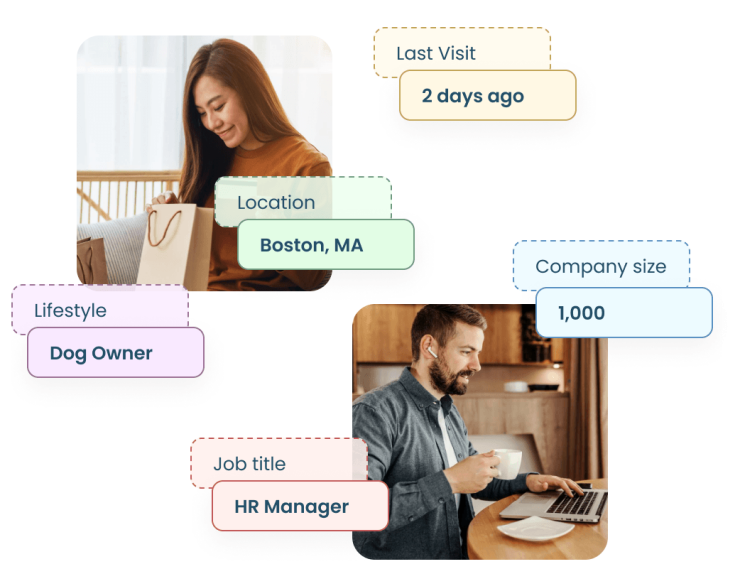Customers expect seamless and personalized experiences across every touchpoint.
Whether they’re browsing your website, engaging with your mobile app, or interacting with your customer service team, they want a consistent and tailored experience that feels like an extension of their relationship with your brand.
This is where identity resolution comes into play, acting as the glue that binds all these channels together and enables a truly omnichannel customer experience.
Why Does Identity Resolution Matter?
Identity resolution is the process of connecting disparate data points across multiple channels and platforms to create a unified and comprehensive view of each customer.
It involves gathering and linking customer data from various sources, such as website interactions, mobile app usage, customer relationship management (CRM) systems, and even offline touchpoints like in-store purchases or call center interactions.

By resolving customer identities, businesses can gain a 360-degree view of each individual, understanding their preferences, behaviors, and journey with the brand.
This level of insight is crucial for delivering personalized experiences, improving customer satisfaction, and driving loyalty and retention.
Without identity resolution, customer data remains siloed, fragmented, and disconnected, making it nearly impossible to provide a cohesive and tailored experience across channels.
The Key Benefits of Identity Resolution for Customer Experience
Implementing identity resolution can unlock a myriad of benefits that directly impact the customer experience:
-
Personalization at Scale: With a unified view of each customer, businesses can deliver highly personalized experiences tailored to individual preferences and behaviors through personalized product recommendations, targeted marketing campaigns, or customized support interactions.
-
Seamless Omnichannel Experiences: Identity resolution ensures customer interactions are consistent and seamless across all channels, creating a frictionless and cohesive experience that builds trust and loyalty.
-
Improved Customer Insights: By consolidating customer data, businesses gain deeper insights into behaviors, preferences, and pain points to better meet customer needs through strategic decisions, product development, and optimization efforts.
-
Enhanced Customer Support: With comprehensive customer histories, support teams can provide personalized, efficient assistance by quickly accessing relevant information, anticipating needs, and resolving issues effectively.
-
Increased Customer Lifetime Value: By delivering exceptional experiences and fostering stronger relationships, businesses can increase customer loyalty, retention, and ultimately, customer lifetime value.
Implementing Identity Resolution: Best Practices
While the benefits are clear, implementing identity resolution requires careful planning and execution. Here are some best practices:
-
Data Integration and Management: Invest in robust data management systems and processes to ensure data accuracy, completeness, and consistency across various online and offline sources.
-
Privacy and Compliance: Prioritize data governance and compliance with regulations like GDPR and CCPA, implementing identity resolution transparently and ethically with clear communication to customers.
-
Technology and Infrastructure: Evaluate and select the right tools and platforms to support data integration, identity matching, and customer profile management.
-
Cross-Functional Collaboration: Foster alignment across departments like marketing, sales, customer service, and IT to break down silos and enable successful omnichannel strategy implementation.
-
Continuous Optimization and Measurement: Establish key performance indicators (KPIs) and regularly analyze customer data and feedback to identify areas for improvement and refine strategies.
Delivering seamless and personalized experiences across multiple channels is a necessity for marketers.
Identity resolution plays a pivotal role in enabling this omnichannel experience by connecting disparate customer data and creating a unified view of each individual.
By implementing identity resolution effectively, businesses can unlock personalization at scale, enhanced customer insights, improved support, and increased loyalty.
However, it’s crucial to approach identity resolution strategically, prioritizing data governance, technology investments, cross-functional collaboration, and continuous optimization.
As customer expectations evolve, embracing identity resolution will differentiate businesses seeking to deliver exceptional customer experiences and foster long-lasting relationships.
FAQs
-
What is identity resolution in customer experience?
Identity resolution is the process of connecting customer data from multiple sources to create a unified customer profile, enabling personalized omnichannel experiences. -
Why is identity resolution important for omnichannel customer experiences?
Identity resolution ties together customer interactions across channels, allowing businesses to provide consistent and tailored experiences that build trust and loyalty. -
How does identity resolution improve personalization?
By consolidating customer data, identity resolution enables businesses to deliver highly personalized content, recommendations, and experiences tailored to individual preferences and behaviors. -
What are the benefits of identity resolution for customer support?
With a comprehensive view of each customer’s history, support teams can provide more efficient and personalized service, anticipating needs and resolving issues effectively. -
How can identity resolution increase customer lifetime value?
By fostering stronger customer relationships through exceptional omnichannel experiences, identity resolution can drive higher customer loyalty, retention, and lifetime value. -
What are some best practices for implementing identity resolution?
Key best practices include robust data management, prioritizing privacy and compliance, investing in the right technology, fostering cross-functional collaboration, and continuous optimization. -
How does identity resolution support omnichannel marketing?
Identity resolution enables consistent and personalized marketing campaigns across channels, ensuring customers receive relevant messaging that aligns with their preferences and behaviors. -
What role does identity resolution play in offline customer experiences?
Identity resolution can integrate offline data sources, such as in-store purchases or call center interactions, into a unified customer profile for a seamless omnichannel experience. -
How can businesses ensure data privacy and compliance with identity resolution?
Businesses must implement transparent data governance policies, obtain customer consent, and adhere to regulations like GDPR and CCPA when leveraging customer data for identity resolution. -
What are the challenges of implementing identity resolution?
Common challenges include data silos, data quality issues, technological limitations, organizational silos, and resistance to change, which require careful planning and execution to overcome.

